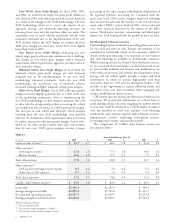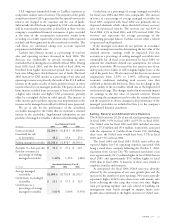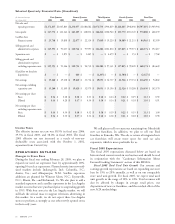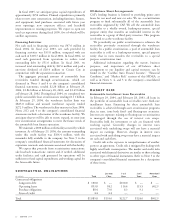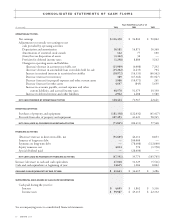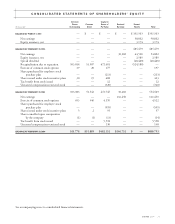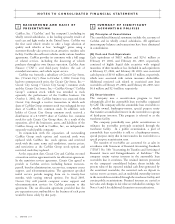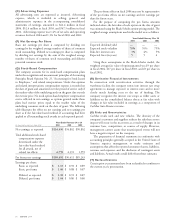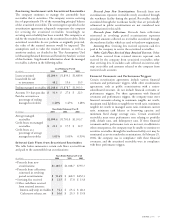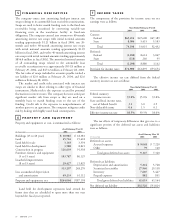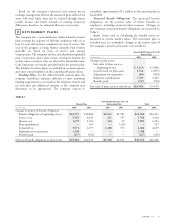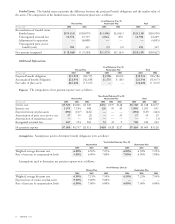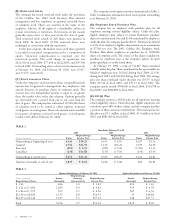CarMax 2004 Annual Report Download - page 34
Download and view the complete annual report
Please find page 34 of the 2004 CarMax annual report below. You can navigate through the pages in the report by either clicking on the pages listed below, or by using the keyword search tool below to find specific information within the annual report.
32
CARMAX
2004
BACKGROUND AND BASIS OF
PRESENTATION
CarMax, Inc. (“CarMax” and “the company”), including its
wholly owned subsidiaries, is the leading specialty retailer of
used cars and light trucks in the United States. CarMax was
the first used vehicle retailer to offer a large selection of
quality used vehicles at low, “no-haggle” prices using a
customer-friendly sales process in an attractive, modern sales
facility. CarMax also sells new vehicles under various franchise
agreements. CarMax provides its customers with a full range
of related services, including the financing of vehicle
purchases through its own finance operation, CarMax Auto
Finance (“CAF”), and third-party lenders; the sale of
extended warranties; and vehicle repair service.
CarMax was formerly a subsidiary of Circuit City Stores,
Inc. (“Circuit City”). Prior to October 1, 2002, Circuit City
had two common stock series, the Circuit City Stores, Inc.—
Circuit City Group (“Circuit City Group”) common stock
and the Circuit City Stores, Inc.—CarMax Group (“CarMax
Group”) common stock, which was intended to track
separately the performance of the CarMax business. On
October 1, 2002, the CarMax business was separated from
Circuit City through a tax-free transaction in which each
share of CarMax Group common stock was exchanged for one
share of CarMax, Inc. common stock. In addition, each
holder of Circuit City Group common stock received a
distribution of a 0.313879 share of CarMax, Inc. common
stock for each Circuit City Group share. As a result of the
separation, all of the businesses, assets, and liabilities of the
CarMax Group are held in CarMax, Inc., an independent,
separately traded public company.
In conjunction with the separation, all outstanding
CarMax Group stock options and restricted stock were
replaced with CarMax, Inc. stock options and restricted
stock with the same terms and conditions, exercise prices,
and restrictions as the CarMax Group stock options and
restricted stock they replaced.
At the separation date, Circuit City and CarMax executed
a transition services agreement and a tax allocation agreement.
In the transition services agreement, Circuit City agreed to
provide to CarMax services including human resources,
payroll, benefits administration, tax services, computer center
support, and telecommunications. The agreement specified
initial service periods ranging from six to twenty-four
months, with varying renewal options. For fiscal 2005,
Circuit City will provide computer center support and
telecommunication services for CarMax pursuant to this
agreement. The tax allocation agreement provided that the
pre-separation taxes attributable to the business of each party
would be borne solely by that party.
1
SUMMARY OF SIGNIFICANT
ACCOUNTING POLICIES
(A) Principles of Consolidation
The consolidated financial statements include the accounts of
CarMax and its wholly owned subsidiaries. All significant
intercompany balances and transactions have been eliminated
in consolidation.
(B) Cash and Cash Equivalents
Cash equivalents of $48.9 million and $29.6 million at
February 29, 2004, and February 28, 2003, respectively,
consisted of highly liquid debt securities with original
maturities of three months or less. Included in cash equivalents
at February 29, 2004, and February 28, 2003, were restricted
cash deposits of $13.0 million and $11.5 million, respectively,
which were associated with certain insurance deductibles.
Additional restricted cash related to securitized auto loan
receivables at February 29, 2004, and February 28, 2003, were
$6.4 million and $2.4 million, respectively.
(C) Securitizations
The company uses a securitization program to fund
substantially all of the automobile loan receivables originated
by CAF. The company sells the automobile loan receivables to
a wholly owned, bankruptcy-remote, special purpose entity
that transfers an undivided interest in the receivables to a group
of third-party investors. This program is referred to as the
warehouse facility.
The company periodically uses public securitizations to
refinance the receivables previously securitized through the
warehouse facility. In a public securitization, a pool of
automobile loan receivables is sold to a bankruptcy-remote,
special purpose entity that in turn transfers the receivables to a
special purpose securitization trust.
The transfers of receivables are accounted for as sales in
accordance with Statement of Financial Accounting Standards
(“SFAS”) No. 140, “Accounting for Transfers and Servicing of
Financial Assets and Extinguishments of Liabilities.” The
company retains various interests in the automobile loan
receivables that it securitizes. The retained interests presented
on the company’s consolidated balance sheets include the
present value of the expected residual cash flows generated by
the securitized receivables, the restricted cash on deposit in
various reserve accounts, and an undivided ownership interest
in the receivables securitized through the warehouse facility and
certain public securitizations. Retained interests are carried at
fair value and changes in fair value are included in earnings. See
Notes 3 and 4 for additional discussion on securitizations.
2
NOTES TO CONSOLIDATED FINANCIAL STATEMENTS


